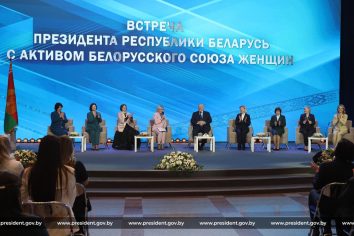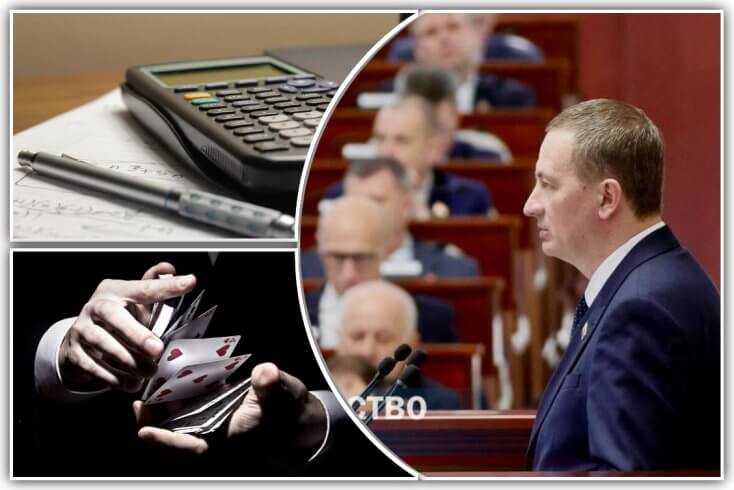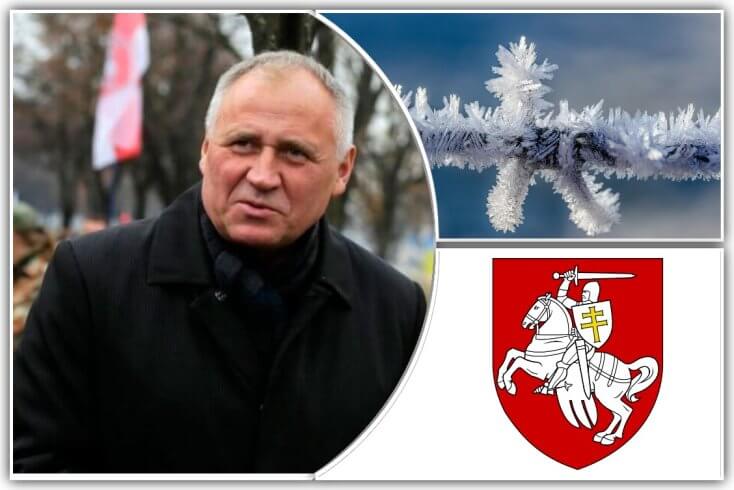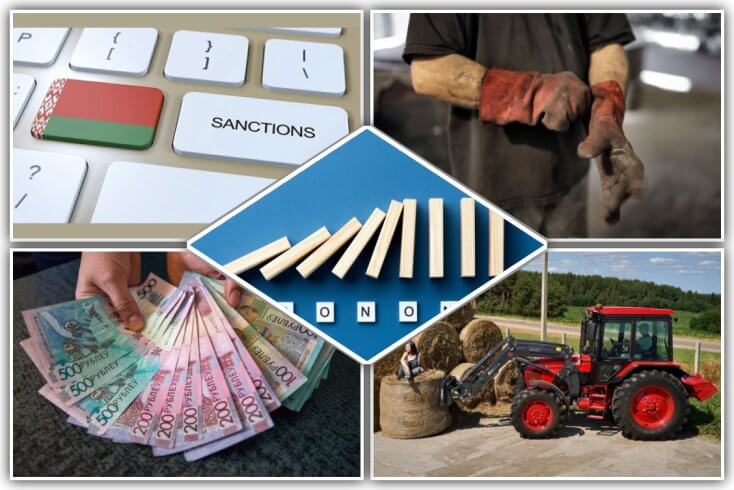Alaksandar Łukašenka demonstrated his skills in flattering women at a meeting with activists of the pro-government Belarusian Women’s Union (BWU) on March 5. While he spares no compliments for loyal women, his government has put hundreds of female opponents to prison for political dissent.
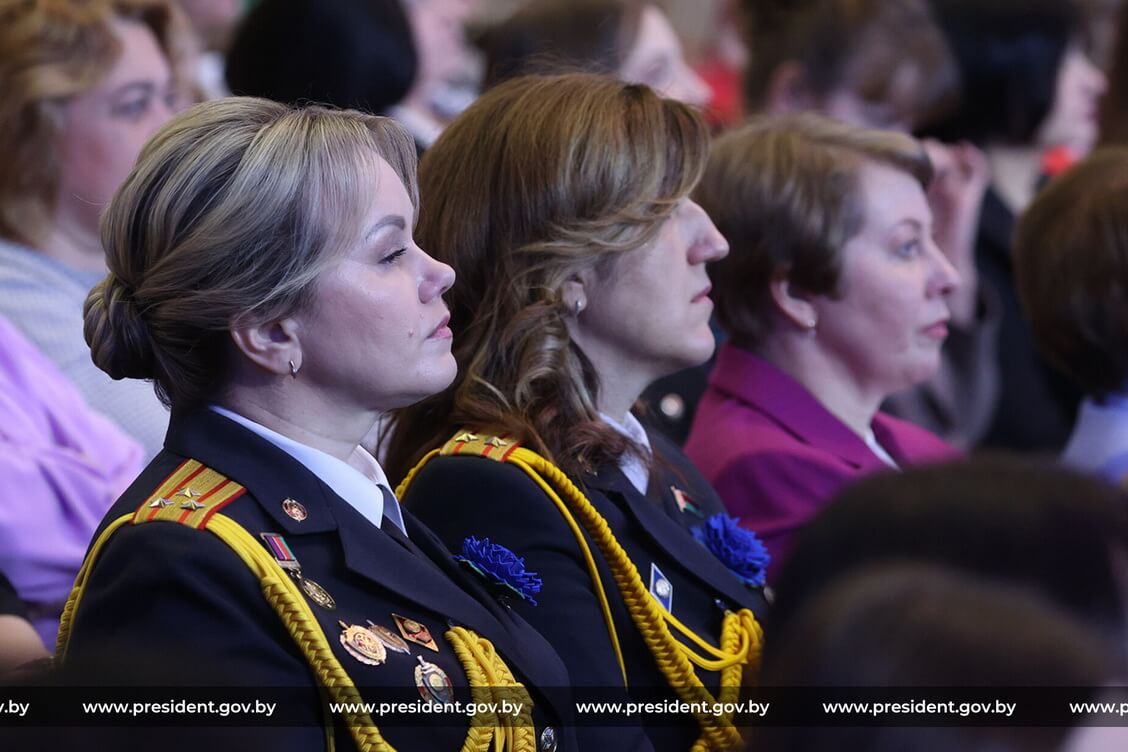
Łukašenka’s gallantry quickly vanishes when he talks about opposition leader Śviatłana Cichanoŭskaja who disputed his victory in the 2020 presidential election.
Compliments
“I certainly understand that women feel good about me,” Łukašenka said at the meeting.
“Because I am your most ardent supporter and a man far from ideal but exceptionally devoted to women. I believe that our nature has created nothing more perfect than a woman. That is my firm conviction.
“If you did not exist, men would have gone mad and started wars long ago, even in Belarus.
“There are no women in the world more beautiful than Belarusian women. . . .
“If we had a women’s [political] party, it would be unrivaled. . . . But what for? People do not really take parties seriously.”
Ironically, his government hardly tolerates even loyal parties, and has shut down all opposition ones.
In 2007, the Supreme Court closed down the Belarusian Women’s Party “Nadzeja” for alleged paperwork irregularities.
Łukašenka called the BWU a pillar of civil society. This is how he promotes government-organized non-governmental organizations (GONGOs) trying to fill the vacuum created by the brutal purge of the third sector after the 2020 postelection protests.
Łukašenka hopes that the loyalists will pay him back by supporting his initiatives.
No respect for female dissenters
Once a woman opposes his policies, his fake respect for ladies disappears.
Łukašenka has repeatedly claimed that he does not fight women. He repeated that claim twice in July 2021, but called Śviatłana Cichanoŭskaja “scum” anyway.
He must be well aware that most Belarusians voted for Cichanoŭskaja, just a housewife at the time, in 2020.
Why did he let her run? Apparently, sexism played a role. Probably, his advisors convinced him that he would spectacularly defeat the politically inexperienced woman and demonstrate political pluralism to the West.
“A man will become president, I am absolutely sure of it,” Lukashenka said arrogantly one month before the vote during a visit to the Minsk Tractor Plant. By then, the campaign team of her husband Siarhej Cichanoŭski was already denied registration.
“He is not even a presidential candidate; he is just rooting for his wife. He realizes that no one in Belarus will vote for a woman,” Łukašenka said about Cichanoŭskaja and her husband.
“Our constitution has not been made for a woman. And our society is not mature enough to vote for a woman because the president has strong powers under the constitution.”
These are his genuine views on gender and the role of women in politics. It is easy to shine like the sun at the meeting with pro-government female activists, it is much more difficult to give women real powers.
Female political opponents
In the summer of 2020, while Łukašenka was touring military and police units to morally prepare his security forces for suppressing protests, the female opposition trio led by Cichanoŭskaja was building momentum in the presidential race.
On August 9, many Belarusians voted for Cichanoŭskaja not because of her gender but because she was a symbol of change and protest against the dictator.
After police brutally suppressed the first wave of protests, hundreds of women dressed in white and carrying flowers took to the streets, sparking a second wave, and the regime began to ruthlessly crush the peaceful uprising.
Women were beaten and tortured. They have been sentenced to lengthy prison terms, and some have been ill-treated behind bars to this day.
On the day Łukašenka was showering compliments to his supporters, a new trial opened at a Homiel court against Volha Majorava already serving 20 years in prison for political dissent. She is accused of “malicious disobedience” to the prison administration, a charge routinely used to prolong political prisoners’ sentences.
Journalist Kaciaryna Andrejeva, for instance, was first sentenced to two years in prison for broadcasting live from an opposition rally and later prosecutors added eight more years to her sentence, allegedly for high treason.
New charges have been brought against Palina Šarenda-Panasiuk. The mother of two has not broken down behind bars and is standing tall despite spending long time in the punishment cell.

Volha Załatar, the mother of five underage children, was sentenced to four years for taking part in opposition protests. Calls for her release have hit a deaf wall.
Since February 15 last year, there has been no news from Maryja Kaleśnikava sentenced to 11 years in prison.
According to the Human Rights Center Viasna, there were 170 female political prisoners in Belarus at the end of February.
In addition, 361 female political prisoners have served their sentences and have been released, sentenced to non-custodial punishment or have been amnestied.
Human rights activists are not aware of all cases, in which women have been prosecuted for political reasons.
Volha Harbunova, of the opposition’s United Transitional Cabinet, said that since 2020 “at least 895 women have gone through prisons and unfair trials [for political reasons].”
Last year, Cichanoŭskaja was sentenced in absentia to 15 years in prison for alleged high treason, conspiracy to seize power and establishing and leading an extremist group.
All he really loves is power
Łukašenka encourages women to have more children.
In August 2018, during his visit to a rural hospital, he urged young mothers to give birth to at least three or four.
In November 2020, he reduced his expectation to two or three. Otherwise, he said, there would be no one left in Belarus in half a century.
“We need people. The demographic problem . . . you women don’t seem to want to have children today,” Łukašenka said in October during his trip to the Brest district.
It is true that the birth rate has fallen. Łukašenka is mostly concerned about a shortage of obedient workers and soldiers, not about free personal development.
The exodus from Belarus following the 2020 crackdown is a national tragedy. Some are fleeing to escape imprisonment; others are looking for better opportunities to realize their potential. Many Belarusians see no future under Łukašenka’s dictatorship.
Most of them are young, progressive, dynamic and entrepreneurial. Under normal circumstances, they would have families and children in Belarus.
Afraid of loosening the screws, he prefers the exodus and depletion of the nation’s gene pool to civil accord.
Łukašenka keeps saying that he loves women, but the only thing he really loves is power, sacrificing the country’s future and crushing the dreams and prospects of men and those he calls “the beautiful half.”
